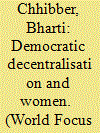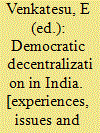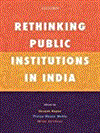|
|
|
Sort Order |
|
|
|
Items / Page
|
|
|
|
|
|
|
| Srl | Item |
| 1 |
ID:
125258


|
|
|
|
|
| Publication |
2013.
|
| Summary/Abstract |
For democratic decentralization it is pertinent that democracy is seen as a broad participatory process in which citizens at the grass-root level take part directly in decisions affecting them, their community and their work. Though women form a sizable part of any country's population, their political representation and participation is definitely below the mark. Through the 73rd Constitutional amendment, India moved towards a big change in institutional framework of governance with 33% reservation for women at the local level i.e. panchayats. However, there are structural and procedural bottlenecks still to be taken care of including poverty, lack of education, patriarchal mode of society, lack of financial independence and lack of awareness of political rights which hamper women's ability to take independent decisions.
|
|
|
|
|
|
|
|
|
|
|
|
|
|
|
|
| 2 |
ID:
148403


|
|
|
|
|
| Publication |
Oxon, Routledge, 2016.
|
| Description |
xxviii, 269p.: figures, tableshbk
|
| Standard Number |
9781138219632
|
|
|
|
|
|
|
|
|
|
|
|
Copies: C:1/I:0,R:0,Q:0
Circulation
| Accession# | Call# | Current Location | Status | Policy | Location |
| 058858 | 320.8054/VEN 058858 | Main | On Shelf | General | |
|
|
|
|
| 3 |
ID:
128521


|
|
|
|
|
| Publication |
2013.
|
| Summary/Abstract |
Asia is the most populous and rapidly urbanizing region in the world today and features 23 of the world's 40 biggest metropolitan areas. In many Asian countries, accelerated economic development, industrialization and urbanization have been accompanied by a growing acceptance that decentralization (the devolution of central state powers, responsibilities and resources to the sub-national scale)4 can lead to more effective and responsive governance in state, provincial, city and regency jurisdictions. This trend toward decentralized governance in Asia has often, but not always, been precipitated by a transition away from authoritarian regimes to more democratic forms of governance. Discourses about the desirability of democratic decentralization have typically emphasized the devolution of central state authority as the preferred means by which to empower communities and to increase the voice and participation of ordinary citizens in governmental decision-making processes that affect their lives and livelihoods. Thus, decentralization policies in urbanizing Asia have aimed to encourage the active involvement of urban residents in addressing shared dilemmas concerning issues such as environmental sustainability, public service delivery, community building and socio-political stability in often densely concentrated and ethnically diverse populations. At the same time, however, decentralization within the contexts of globalization and privatization may circumvent critical aspects of democratic procedure if sub-national government officials use their increased access to state power and resources to nurture clientelistic networks of patronage and/or to tap into wider circles of regional or global economic activity at the expense of local urban development.
|
|
|
|
|
|
|
|
|
|
|
|
|
|
|
|
| 4 |
ID:
152484


|
|
|
|
|
| Publication |
New Delhi, Oxford University Press, 2017.
|
| Description |
xvii, 527p.: tables, figureshbk
|
| Standard Number |
9780199474370
|
|
|
|
|
|
|
|
|
|
|
|
Copies: C:1/I:0,R:0,Q:0
Circulation
| Accession# | Call# | Current Location | Status | Policy | Location |
| 059018 | 306.2/KAP 059018 | Main | On Shelf | General | |
|
|
|
|
|
|
|
|
|